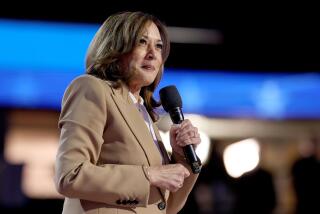Bradley Tops Gore in Last Quarter in Race for Money
- Share via
WASHINGTON — Bill Bradley raised twice as much money as Vice President Al Gore in the final three months of 1999, putting the Democratic presidential candidates in a virtual tie in the race for campaign funds.
Figures released Wednesday by the two campaigns show that the former New Jersey senator raised $8 million in the year’s final quarter, bringing his total for the year to more than $27 million. While Gore raised only $4 million in the same period, according to a spokesman, his yearly total of $28 million in campaign funds puts him just ahead of Bradley. In addition, Gore expects to reap more in federal matching funds.
Yet the news of Bradley’s continued success at raising money, coming just five weeks before the primary season begins, could raise new questions about the campaign of the vice president, who earlier was widely considered the certain Democratic nominee.
“It’s evidence of Al Gore’s fragile hold on the nomination,” said Bill Connelly, a politics professor at Washington & Lee University in Virginia. “As the Democratic establishment’s heir apparent, he appears to be highly vulnerable. Bradley clearly is in position to compete with Gore over the long haul.”
On the Republican side, Sen. John McCain of Arizona also has picked up the fund-raising pace in his effort to upset the front-runner, Texas Gov. George W. Bush. McCain’s estimated haul of $6 million in the final three months of 1999--twice the amount raised in the previous quarter--comes as McCain’s stock is rising in public opinion polls.
A critical factor in the closely fought two-way Democratic race will be the amount of money each side has available to spend on television and radio advertising. Bradley’s campaign reported having $8.3 million in its treasury at year’s end, with an expectation of an additional $10 million in federal matching funds.
Gore spokesman Chris Lehane declined to give an estimate of the amount of cash the vice president’s campaign has on hand. Gore is expecting to get more than $14 million early next year in matching funds, Lehane said. Federal matching formulas reward candidates that have large numbers of donors.
But a senior Gore strategist, who spoke on condition of anonymity, said the campaign expected to report less cash on hand than Bradley. But with Gore’s edge in federal matching funds, the strategist insisted, the bottom line would even out.
“Money will be a nonfactor in this campaign. Both campaigns will have the same amount to spend in the primaries, meaning there won’t be an advantage for either candidate.”
But from the outset, Gore, with all the political advantages of an incumbent vice president, expected far more than a level playing field.
“That’s what’s amazing, that it is level. One would have expected that Gore would be far ahead,” said Herbert E. Alexander, a professor emeritus of political science at USC. Alexander said that a stiff fight for the Democratic nomination could also help the Republicans in the general election if Bush is able to capture his party’s nomination. “This bodes ill for the Gore campaign, sparks enthusiasm for the Bradley campaign and raises questions about what happens after” the primary season.
But McCain hopes early primary victories will help him break ahead of Bush. To that end, he has raised more than $15 million for the year and expects $6 million in federal matching funds early next year. McCain’s cash on hand now is about $1.5 million, according to his campaign.
Yet his war chest still pales next to Bush’s. The Bush campaign, which has smashed fund-raising records, said it would release a financial update today but confirmed previously published reports that its take for 1999 will exceed $63 million.
Bush’s fund-raising this year has been so prolific that he has opted to forgo federal matching funds--and the spending limits that come with them--during the primaries.
Fund-raising estimates from other GOP candidates--social activist Gary Bauer, former diplomat Alan Keyes, Sen. Orrin G. Hatch of Utah and millionaire publisher Steve Forbes--were not available. Candidates are required to file year-end reports of spending and fund-raising with the Federal Election Commission by Jan. 31.
*
Times staff writer Mark Z. Barabak contributed to this story.
More to Read
Get the L.A. Times Politics newsletter
Deeply reported insights into legislation, politics and policy from Sacramento, Washington and beyond. In your inbox twice per week.
You may occasionally receive promotional content from the Los Angeles Times.










